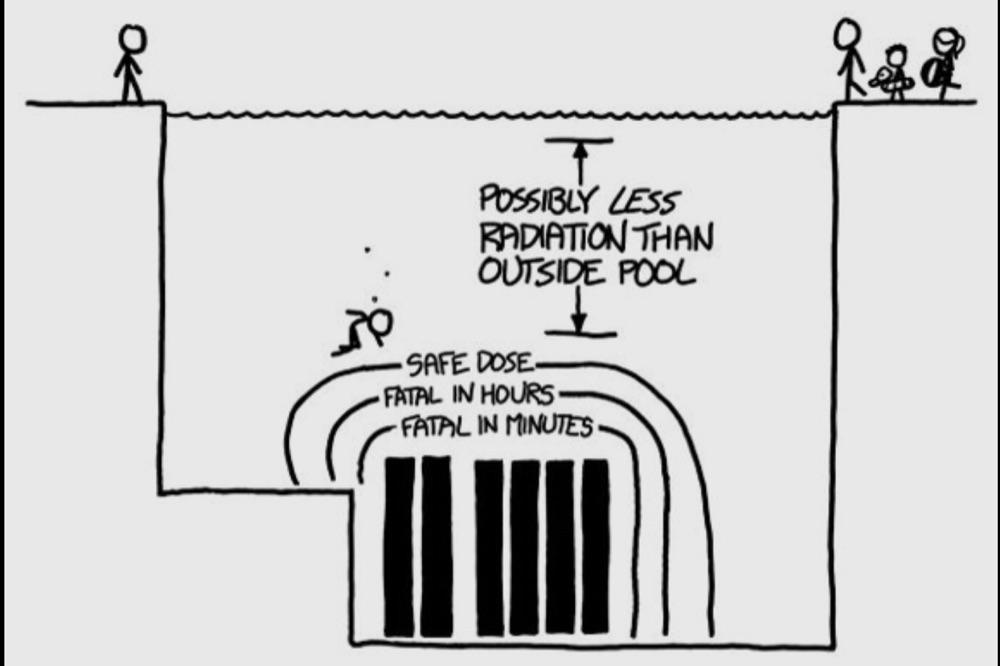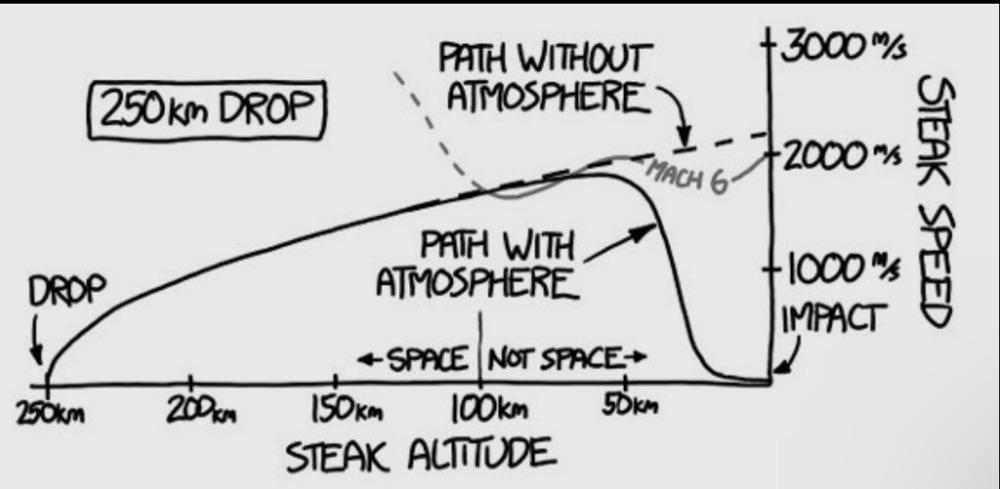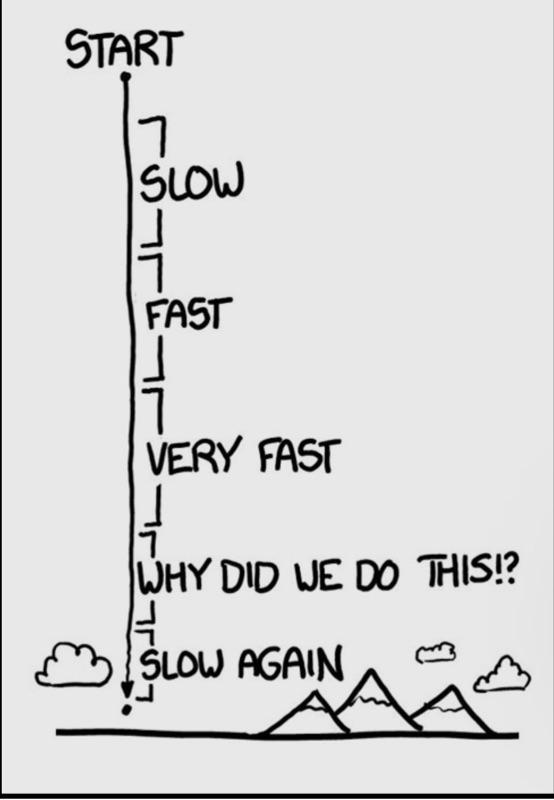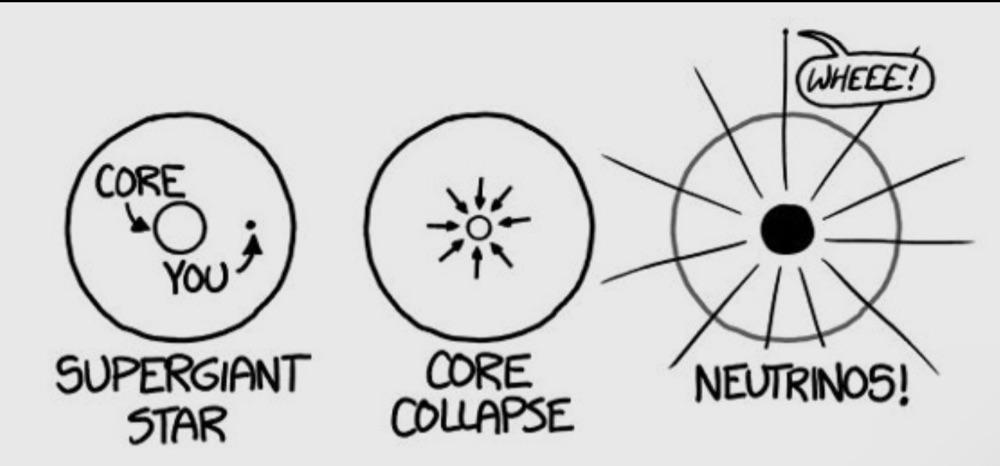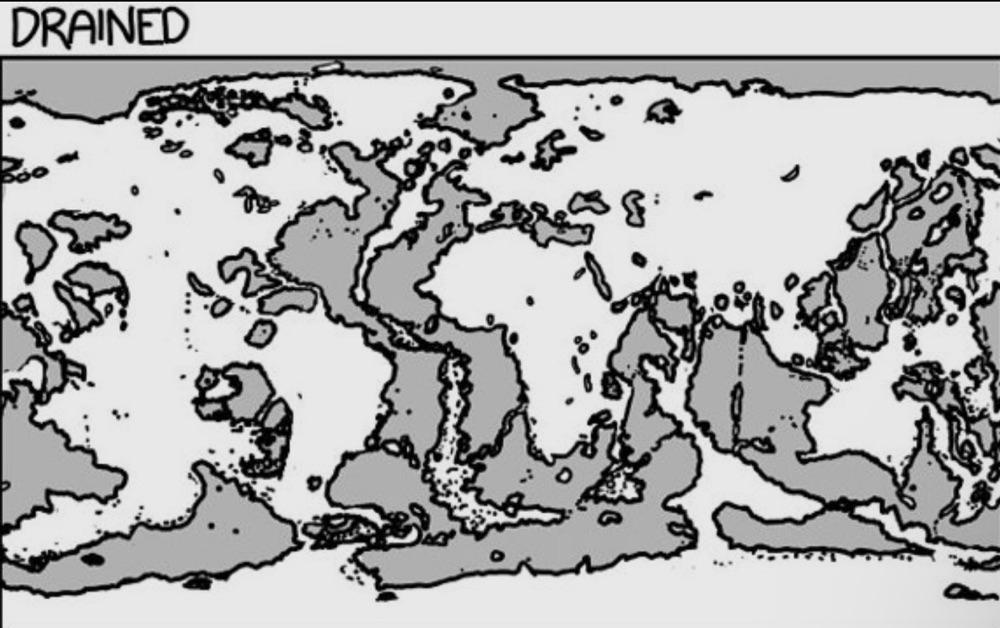Prince Rahul's Key Ideas from What If?
by Randall Munroe
Ideas, facts & insights covering these topics:
27 ideas
·79.5K reads
224
5
Explore the World's Best Ideas
Join today and uncover 100+ curated journeys from 50+ topics. Unlock access to our mobile app with extensive features.
Global Windstorm
Q. What would happen if the Earth and all terrestrial objects suddenly stopped spinning, but the atmosphere retained its velocity?
- Nearly everyone would die.
- At the equator, the Earth’s surface is moving at about 470 meters per second—relative to its axis. If the Earth stopped and the air didn’t, the result would be a sudden thousand-mile-per-hour wind.
- Day and night would each be six months long.
624
9.03K reads
Relativistic Baseball
Q. What would happen if you tried to hit a baseball pitched at 90 percent the speed of light?
- It would, however, start to eat away at the surface, blasting tiny fragments of the ball in all directions. These fragments would be going so fast that when they hit air molecules, they would trigger two or three more rounds of fusion.And with a great roar, the blast wave would arrive, tearing up trees and shredding houses.
591
6.39K reads
Spent Fuel Pool
Q. What if I took a swim in a typical spent nuclear fuel pool? Would I need to dive to actually experience a fatal amount of radiation? How long could I stay safely at the surface?
- You could probably survive treading water anywhere from 10 to 40 hours.
- Spent fuel from nuclear reactors is highly radioactive. Water is good for both radiation shielding and cooling, so fuel is stored at the bottom of pools for a couple of decades until it’s inert enough to be moved into dry casks.
578
5.09K reads
Everybody Jump
Q. What would happen if everyone on Earth stood as close to each other as they could and jumped, everyone landing on the ground at the same instant?
- It doesn’t really affect the planet. Earth outweighs us by a factor of over ten trillion. On average, we humans can vertically jump maybe half a meter on a good day. Even if the Earth were rigid and responded instantly, it would be pushed down by less than an atom’s width.
593
4.98K reads
Machine-Gun Jetpack
Q. Is it possible to build a jetpack using downward-firing machine guns?
- The principle here is pretty simple. If you fire a bullet forward, the recoil pushes you back. So if you fire downward, the recoil should push you up.
- With enough machine guns, you could fly.
583
4.65K reads
Rising Steadily
Q. If you suddenly began rising steadily at 1 foot per second, how exactly would you die? Would you freeze or suffocate first? Or something else?
- Above 8000 meters—above the tops of all but the highest mountains—the oxygen content in the air is too low to support human life. Near this zone, you would experience a range of symptoms, possibly including confusion, dizziness, clumsiness, impaired vision, and nausea.
- The result would be a rapid loss of consciousness and death.
579
3.84K reads
Size Of Internet
Q. How much physical space does the Internet take up?
- The storage industry produces in the neighborhood of 650 million hard drives per year. If most of them are 3.5-inch drives, that’s 8 liters (2 gallons) of hard drive per second.
- This means the last few years of hard-drive production represents the majority of global storage capacity—would just about fill an oil tanker.
- So, by that measure, the Internet is smaller than an oil tanker.
603
3.93K reads
Lightning
Q. How dangerous is it, really, to be in a pool during a thunderstorm?
- Pretty dangerous. Water is conductive, but that’s not the biggest problem—the biggest problem is that if you’re swimming, your head is poking up from a large flat surface. But lightning striking the water near you would still be bad. The 20,000 amps spread outward—mostly over the surface.
575
3.71K reads
Bullet Vs Lightning
Q. What would happen if lightning struck a bullet in midair?
- If it were sitting still, the current would quickly heat and melt the metal.
- But since it would be moving along so quickly, it would exit the channel before it could be warmed by more than a few degrees. It would continue on to its target relatively unaffected.
576
3.36K reads
Human Computer
Q. How much computing power could we could achieve if the entire world population stopped whatever we are doing right now and started doing calculations?How would it compare to a modern-day computer or smartphone?
- The processor in a mobile phone could do calculations about 70 times faster than the entire world population. A new high-end desktop PC chip would increase that ratio to 1500.
- Under Moore’s law–based projections, and using these simulation figures, computers won’t pull ahead of humans until the year 2036.7
583
3.11K reads
Little Planet
Q. If an asteroid was very small but supermassive, could you really live on it like the Little Prince?
- If the asteroid had a radius of 1.75 meters, then in order to have Earthlike gravity at the surface, it would need to have a mass of about 500 million tons. This is roughly equal to the combined mass of every human on Earth.
- The escape velocity at the surface would be about 5 meters per second. That’s slower than a sprint, but still pretty fast.
576
2.77K reads
Steak Drop
Q. From what height would you need to drop a steak for it to be cooked when it hit the ground?
- No matter how fast it was going when it reached the lower layers of the atmosphere, it would quickly slow down to terminal velocity. No matter the starting height, it always takes six or seven minutes to drop from 25 kilometers to the ground.
- When the steak does finally hit the ground, it will be traveling at terminal velocity—about 30 meters per second. Steak will remain as it is.
574
2.45K reads
Hockey Puck
Q. How hard would a puck have to be shot to be able to knock the goalie himself backward into the net?
- This can’t really happen.
- If you’re like me, when you first saw this question, you might’ve imagined the puck leaving a cartoon-style hockey-puck-shaped hole. But that’s because our intuitions are shaky about how materials react at very high speeds.
- Instead, a different mental picture might be more accurate: Imagine throwing a ripe tomato—as hard as you can—at a cake. That’s about what would happen.
570
2.17K reads
No More DNA
Q. This may be a bit gruesome, but . . . if someone’s DNA suddenly vanished, how long would that person last?
- If you lost your DNA, you would instantly be about a third of a pound lighter.
- Losing your DNA would most likely result in abdominal pain, nausea, dizziness, rapid immune system collapse, and death within days or hours from either rapid systemic infection or systemwide organ failure.
576
2.4K reads
Yoda
Q. How much Force power can Yoda output?
- Combining this with the X-wing mass and lift rate gives us our peak power output: That’s enough to power a block of suburban homes. It’s also equal to about 25 horsepower. At current electricity prices, Yoda would be worth about $2/hour.
- So Yoda sounds like our best bet as an energy source. But with world electricity consumption pushing 2 terawatts, it would take a hundred million Yodas to meet our demands.
579
1.86K reads
Falling with Helium
Q. What if I jumped out of an airplane with a couple of tanks of helium and one huge, un-inflated balloon? Then, while falling, I release the helium and fill the balloon. How long of a fall would I need in order for the balloon to slow me enough that I could land safely?
- If you inflated the balloons quickly, possibly by connecting many canisters to it at once, you’d be able to slow your fall.
- Just don’t use too much helium, or you’ll end up floating at 16,000 feet like Larry Walters.
573
1.86K reads
Everybody Out
Q. Is there enough energy to move the entire current human population off-planet?
- An absolute baseline energy requirement: 4 gigajoules per person. No matter how we do it, whether we use rockets or a cannon or a space elevator or a ladder, moving a 65-kilogram person—out of the Earth’s gravity well requires at least this much energy.
- Launching all of humanity (total weight: around 400 million tons) would therefore take tens of trillions of tons of fuel.
577
1.9K reads
Self-Fertilization
Q. I read about some researchers who were trying to produce sperm from bone marrow stem cells. If a woman were to have sperm cells made from her own stem cells and impregnate herself, what would be her relationship to her daughter?
- A child from a parent who self-fertilized would be like a clone of the parent. But the child wouldn’t have all the genes of the parent. Half the child’s chromosomes would have their “partner” chromosomes replaced by a copy of themselves.
- It’s what you would expect in a child of three generations of consecutive sibling marriages.
577
1.87K reads
Lethal Neutrinos
Q. How close would you have to be to a supernova to get a lethal dose of neutrino radiation?
- Neutrinos are ghostly particles that barely interact with the world at all. Look at your hand—there are about a trillion neutrinos from the Sun passing through it every second.
- If you observed a supernova from 1 AU away—and you somehow avoided being incinerated, vaporized—even the flood of ghostly neutrinos would be dense enough to kill you.
572
1.61K reads
Speed Bump
Q. How fast can you hit a speed bump while driving and live?
- The two main things protecting you from bumps in the road are the tires and the suspension.
- Cars generate lift. The air flowing around a car exerts all kinds of forces on it.
- At the range of 150–300 mph, a typical sedan would lift off the ground, tumble, and crash . . . before you even hit the bump.
573
1.67K reads
Drain the Oceans
Q. How quickly would the oceans drain if a circular portal 10 meters in radius leading into space were created at the bottom of Challenger Deep, the deepest spot in the ocean? How would the Earth change as the water was being drained?
- It would actually take hundreds of thousands of years for the ocean to drain. Even though the opening is wider than a basketball court, and the water is forced through at incredible speeds, the oceans are huge.
574
1.62K reads
Random Sneeze Call
Q. If you call a random phone number and say “God bless you,” what are the chances that the person who answers just sneezed?
- It’s hard to find good numbers on this, but it’s probably about 1 in 40,000.
- Before you pick up the phone, you should also keep in mind that there’s roughly a 1 in 1,000,000,000 chance that the person you’re calling just murdered someone.
578
1.74K reads
Weightless Arrow
Q. Assuming a zero-gravity environment with an atmosphere identical to Earth’s, how long would it take the friction of air to stop an arrow fired from a bow? Would it eventually come to a standstill and hover in midair?
- The arrow would slow down quickly. Air resistance is proportional to speed squared, which means that when it’s going fast, the arrow would experience a lot of drag.
- But at minimum, it would probably fly 5 to 10 kilometers.
570
1.51K reads
Facebook of the Dead
Q. When, if ever, will Facebook contain more profiles of dead people than of living ones?
- Either the 2060s or the 2130s. There are not a lot of dead people on Facebook. The main reasons for this is that Facebook—and its users—are young. The average Facebook user has gotten older over the last few years, but the site is still used at a much higher rate by the young than by the old.
573
1.6K reads
Stirring Tea
Q. I was absentmindedly stirring a cup of hot tea, when I got to thinking, “Aren’t I actually adding kinetic energy into this cup?” I know that stirring does help to cool down the tea, but what if I were to stir it faster? Would I be able to boil a cup of water by stirring?
- No.
- If you stir hard enough that your tea cavitates, its surface area will increase very rapidly, and it will cool to room temperature in seconds. No matter how hard you stir your tea, it’s not going to get any warmer.
570
1.46K reads
Raindrop
Q. What if a rainstorm dropped all of its water in a single giant drop?
- In this storm, all that water instead condenses into one giant drop, a sphere of water over a kilometer in diameter.
- The drop is now falling at 90 meters per second (200 mph).
- When the water contacted the surface, you’d be crushed to death—the shockwave would briefly create pressures exceeding those at the bottom of the Mariana Trench.
- Splash continues outward, demolishing all structures out to distances of 20 or 30 kilometers.
577
1.46K reads
SAT Guessing
Q. What if everyone who took the SAT guessed on every multiple-choice question? How many perfect scores would there be?
- The probability of getting all 158 questions right is: That’s one in 27 quinquatrigintillion.
- How certain is it? Well, if they each used a computer to take the test a million times each day, and continued this every day for five billion years—the chance of any of them ever getting a perfect score on just the math section would be about 0.0001 percent.
571
1.43K reads
IDEAS CURATED BY
The more one seeks to rise into height and light, the more vigorously do ones roots struggle earthward, downward, into the dark, the deep — into evil.
Curious about different takes? Check out our What If? Summary book page to explore multiple unique summaries written by Deepstash users.
Prince Rahul's ideas are part of this journey:
Learn more about books with this collection
How to set achievable goals
How to create and stick to a schedule
How to break down large projects into smaller manageable tasks
Related collections
Different Perspectives Curated by Others from What If?
Curious about different takes? Check out our book page to explore multiple unique summaries written by Deepstash curators:
1 idea
pbm das's Key Ideas from What If?
Randall Munroe
1 idea
pbm das's Key Ideas from What If?
Randall Munroe
1 idea
pbm das's Key Ideas from What If?
Randall Munroe
Discover Key Ideas from Books on Similar Topics
19 ideas
Good Vibes, Good Life
Vex King
12 ideas
Good Vibes, Good Life
Vex King
14 ideas
Good Vibes, Good Life
Vex King
Read & Learn
20x Faster
without
deepstash
with
deepstash
with
deepstash
Personalized microlearning
—
100+ Learning Journeys
—
Access to 200,000+ ideas
—
Access to the mobile app
—
Unlimited idea saving
—
—
Unlimited history
—
—
Unlimited listening to ideas
—
—
Downloading & offline access
—
—
Supercharge your mind with one idea per day
Enter your email and spend 1 minute every day to learn something new.
I agree to receive email updates
